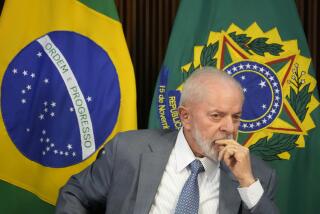Brazil Restores Diplomatic Ties With Cuba After 22-Year Break
- Share via
RIO DE JANEIRO — Brazil on Wednesday re-established diplomatic relations with Cuba after a break of 22 years, Foreign Minister Roberto Abreu Sodre announced at a news conference.
Brazil broke diplomatic relations with Cuba in 1964 shortly after the Brazilian armed forces staged a right-wing military coup that overthrew the leftist but democratically elected government of President Joao Goulart.
During 20 years of military rule that ended here last year, Brazil adhered to a decision by an inter-American foreign ministers’ meeting in 1964 to isolate Cuba diplomatically.
When President Jose Sarney and the civilian opposition came to power in April, 1985, the Brazilian Democratic Movement Party that provides the government majority in Congress voted for a resolution calling for restoration of full diplomatic and commercial relations with Havana.
Support From Intellectuals
The restoration has been urged by most Brazilian intellectuals. Many Cuban cultural groups and sports teams have visited Brazil recently. In turn, a steady flow of Brazilian tourists has been going to to Cuba.
Diplomatic reconciliation between Brazil and Cuba had been expected for months, but the timing of the announcement comes at a moment when Brazil’s relations with United States are strained. Sarney and other top officials here have been angered by the Reagan Administration’s public criticism of Brazil’s legislation restricting data processing investments here by foreign companies, such as IBM.
The hostility to Washington’s policy here has been deepened by the U.S. Treasury Department’s decision to vote against two World Bank loans to Brazil totaling $1 billion. Another cause of contention is growing threat of U.S. protectionist measures against Brazilian exports, ranging from orange juice and ethanol to steel and textiles.
With an international debt of slightly more than $100 million, the Third World’s largest, Brazil has nevertheless maintained interest payments to bank creditors. But it has been pushing for long-term refinancing of its debt, new loans and export expansion to earn the money to pay its debt.
Balking at Payment
The United States has led opposition to any refinancing because Brazil has refused to submit its economic policies to a formal agreement with the International Monetary Fund. Brazil has responded to the refusal to grant new loans by limiting interest payments to government creditors.
These debts of $9 billion include money owed the Export-Import Bank, which has withdrawn export credit guarantees for Brazil.
Because of the accumulating differences, there was talk last month of a meeting between U.S. Secretary of State George P. Shultz and Foreign Minister Sodre. But Foreign Ministry sources said Wednesday that such a meeting “was not under active consideration now”.
More to Read
Sign up for Essential California
The most important California stories and recommendations in your inbox every morning.
You may occasionally receive promotional content from the Los Angeles Times.













